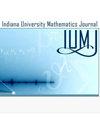含1-拉普拉斯算子的拟线性椭圆型问题的变分和近似解
IF 1.2
2区 数学
Q1 MATHEMATICS
引用次数: 5
摘要
在本文中,我们使用两种不同的方法得到了涉及1−拉普拉斯算子的拟线性椭圆型问题的节点解。在第一篇文章中,我们开发了一种基于最小化能量泛函的方法,该方法与涉及R中的1 -拉普拉斯算子的问题相关,该问题在Nehari集的一个子集上,该子集只包含变号函数。在第二部分中,我们通过对与之相关的p−拉普拉斯问题的解序列的深入分析,得到了一个有界域上包含1−拉普拉斯算子的拟线性椭圆型问题的节点解。在这两种情况下,与涉及签署的解决办法的有关结果相比,出现了一些技术困难。本文章由计算机程序翻译,如有差异,请以英文原文为准。
Nodal solutions to quasilinear elliptic problems involving the 1-Laplacian operator via variational and approximation methods
In this work we use two different methods to get nodal solutions to quasilinear elliptic problems involving the 1−Laplacian operator. In the first one, we develop an approach based on a minimization of the energy functional associated to a problem involving the 1−Laplacian operator in R , on a subset of the Nehari set which contains just sign-changing functions. In the second part we obtain a nodal solution to a quasilinear elliptic problem involving the 1−Laplacian operator in a bounded domain, through a thorough analysis of the sequence of solutions of the p−Laplacian problem associated to it, as p → 1. In both cases, several technical difficulties appear in comparison with the related results involving signed solutions.
求助全文
通过发布文献求助,成功后即可免费获取论文全文。
去求助
来源期刊
CiteScore
2.10
自引率
0.00%
发文量
52
审稿时长
4.5 months
期刊介绍:
Information not localized

 求助内容:
求助内容: 应助结果提醒方式:
应助结果提醒方式:


